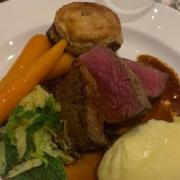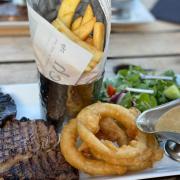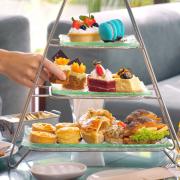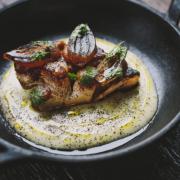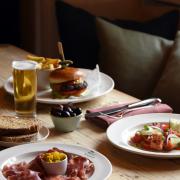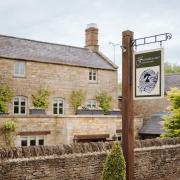The scones, jam and cream of a truly English tea are enough to entice this group of American ladies all the way accross the atlantic.
1773, Boston, New England:
In the cool of the evening, a group of Mohawk Indians in breechcloth and leggings appears quietly on the horizon, making their way stealthily towards Griffin's Wharf. Here, they spot their quarry: the British ships HMS Dartmouth, Beaver and Eleanour, heavily laden with casks of tea. But, wait! Are these really Mohawks...? Or are they, in fact, American dockers - rebel traders - disgruntled by their British rulers? Not content with taxing the colonies to the hilt, the British are now employing dodgy trading practices: with the backing of the government, the British East India Company has been undercutting prices and, as a result, the Americans' healthy tea-importing business is going down the drain. Trouble is brewing...
By the next dawn, the cargo of tea from those three British ships is swilling around Boston harbour: all 45 tons of it, valued at �10,000.
2007, Chipping Campden, Gloucestershire:
In the gentle sun of a beautiful early-summer afternoon, a coach pulls up in the high street of this idyllic rural town. A group of ladies appears, hardly able to get through the bus doors because of the magnificence of their plumage: red hats, black hats, Ascot-type hats, demure hats, extravagant hats. But, wait! Are these really English ladies...? Or are they, in fact, American visitors, determined to give a sense of occasion to taking high tea in the Cotswolds? They've seen their quarry: the 15th century Badgers Hall quintessential English tea rooms. Tea is brewing...
By late afternoon, the cargo of tea in those rooms is swilling around 20 satisfied tummies, alongside smoked salmon on biscuits with cream cheese, prawns in spice, cucumber sandwiches, sausage rolls, crumpets with rarebit, sherry trifle, profiteroles with coffee sauce, ginger shortbread with chocolate mousse, fresh fruit salad, and traditional scones, jam and cream: not quite 45 tons of it, but an undeniably substantial amount, valued at �12-15 per head.
The ladies who take tea have arrived...
Bill Bryson - oh, he tried so hard. But he never really got it: the British obsession with taking tea. He came to terms with B&Bs, full English breakfasts, long conversations about the weather, and even Cecil Parkinson's hair. But no matter how he protested to the contrary, he never really grasped the bit about afternoon tea. The British, he says, "actually like their pleasures small. That is why, I suppose, so many of their treats - teacakes, scones, crumpets, rock cakes, rich tea biscuits, fruit Shrewsburys - are so cautiously flavourful."
Well, thank goodness for The Royal-tea Club: a group of ladies from Pennsylvania, Maryland, Virginia, West Virginia, Delaware, New Jersey, Georgia, Maine and Massachusetts, who have bonded together in the common interest of taking high tea. In fact, they're here in England for a hedonistic fortnight pursuing their very favourite pastime. Unlike our Bill, these connoisseurs not only appreciate the concept of an English afternoon tea, they truly understand it.
"Absolutely we do. We meet together once or twice a month to visit different tea rooms, usually in Pennsylvannia and Maryland."
So you meet in the afternoon - maybe four o'clock-ish?
"No, sometimes it's lunchtime. Maybe 1pm."
Err... OK - but you eat scones and jam and Victoria sponge cake, right?
"Often it will be soup and a salad. Maybe chicken salad."
But with Earl Grey?
"Iced tea. It's still tea to us."
Glad we got that cleared up, then.
Call it what you will, these ladies are tea-drinkers extraordinaire. Patty Suchy is one of them. A travel consultant and writer based in Belcamp, Maryland, she has organised this scone-and-jam-packed tour through her company, Novel Explorations. Today, they're newly-arrived in Chipping Campden, fresh from tea with Mr Darcy in Bath. Patty watches them weave between the wooden tables of the historic Badgers Hall tea rooms, where the exposed beams and Cotswold stone walls tell a story so old, it makes George Washington look the new kid on the block.
Many of these ladies have never been to England before. The Cotswolds are straight out of a picture book - and they're determined to do things properly: hence the fact that so many sport such impressive head gear.
"They've seen a lot of British fashion - Ascot and so on - where the British all wear hats to tea," Patty explains. "So they've been scouring charity shops for all the hats they can find - they want to do things right."
Shirley Smith, from Freeland, is wearing a stunning red hat. "I discovered The Royal-tea Club through the Red Hat Society," she explains. "That's the society for women over 50 that takes its name from the poem, Warning, by Jenny Joseph: "When I am an old woman I shall wear purple/With a red hat that doesn't go and doesn't suit me."
"I know," I explain. "Jenny lives in my village."
There's an awed silence so thick, you could cut and serve it with a silver cake slice.
Perhaps it's all just too much to take in after Bath, and now this most quintessential of Cotswold towns, Chipping Campden. With its honey-coloured stone buildings dating back to the 14th century, it has often been described as the most perfect High Street in England.
"The area I live in is quite rural," continues Shirley, now recovered. "When we first bought there 30 years ago, I'd seen a picture of a Cotswold stone cottage, and I said to my husband: that's what I want you to build for me."
And did he?
"No!" she laughs.
By now, Badgers Hall owner Karen Pinfold is serving the first pots of steaming tea, alongside cucumber sandwiches, sausage rolls covered with sesame seeds, spicy prawns, salmon and cheese on biscuits - all made by her husband, Paul. This is a tea room that doesn't buy in. In the middle of the room is a table of to-die-for sponge cakes: huge, chocolatey dreams stuffed with butter icing and dolloped with toppings. "The art of afternoon tea is undervalued," Karen says. "People put you down if you only make cakes, yet so many of the young chefs these days simply can't do it. We refuse to buy in, which means that Paul can get very busy in the kitchen.
"Occasionally, we've tried to find someone to help him out, but you just can't get the skills."
Certainly, there are 20 ladies in the world who truly value the art of baking. They've been valuing it in Windsor, where they took crumpets at The Crooked House, before moving on to value it in Bath where, alongside Mr Darcy, there was a Pump Room tea and the inevitable trip to Sally Lunn's.
"I've always been fascinated by the Cotswolds," says Roxanne Batterden from Forest Hill, Maryland. "I had such a romantic notion from reading Jane Austen books, and it has lived up to all my expectations. I love driving out into the countryside and seeing the yellow rape fields contrasting with the green; the hints of cottages through the trees; the stone and the flowers."
So, quite different from the States, then...
"Well, actually," says Annie Sanford from Glen Durnie, Maryland, "I was listening to the BBC and I was amazed that the problems on the news were exactly the same as back home: challenges with the youth of today, the price of gas..."
In fact, maybe not so different after all. "When I first moved to Whitehall in Maryland, I could go for miles and not pass anyone," says Marion Coccagna, warming to the theme of rural problems. "Now, it's more houses, more cars. We moved from the city to the country, but it has caught us up."
Roni Dunford agrees. "We're just a three-hour drive from New York, so people are moving out of the city where houses are expensive and buying up here, which pushes our prices up."
Maryland, on the United States' East Coast, ranges from sandy dunes in the east, to oak forests in Piedmont and mountain pines in the west: somewhat different from rolling limestone hills. But the conversation that follows could (bar the accents) be found in any traditional pub the length and breadth of the Cotswolds: how to stop green-field development; the increase in traffic on country roads. "And the people who move in who just don't understand the history of the place," adds Phyllis Clements. "We're trying to protect the area, but when we've gone, who will care? Who will remember what the place used to be like anyway?"
We all nod, pensively. There's a united feeling in the air; a feeling of togetherness through adversity.
It's time to pose The Question. Pouring a strong brew for courage, I ask, "Is Boston forgotten, then?"
As one, they nod in agreement. Let's put it down to tea strain; kettle calling pot black. No point in crying over spilt milk (or tea). Consider it well and truly erased.
And that's pretty generous of them. After all, they need all the history they can get.
Here, in Chipping Campden, the healing process has begun; here are two countries thousands of miles apart, united by the universality of 21st century challenges... Not so very different after all.
"Except for the teas," adds another Royal-tea Club member, looking at Karen arriving laden with mousse, scones, cream, fruit salad, sherry trifle and profiteroles. "There is a real difference there. Unlike you English, we just don't eat like this every day."
Badgers Hall tea rooms are at High Street, Chipping Campden, 01386 840839; www.badgershall.co.uk. More information on The Royal-tea Club is available at www.theroyal-teaclub.org





